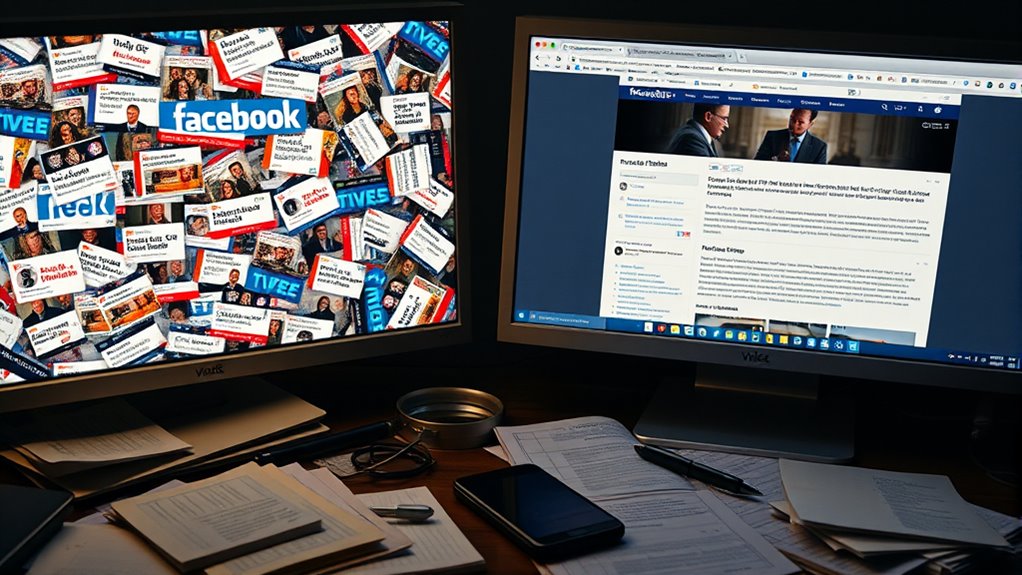In today’s digital world, fake news spreads quickly, often overshadowing truthful information. Your ability to fact-check and think critically helps you navigate this landscape, but algorithms may unintentionally promote sensational stories, making it harder to find reliable sources. To stay informed, you need to question what you see, verify facts through trusted outlets, and recognize bias. Keep exploring—if you understand how to spot misinformation, you’ll be better equipped to see that truth still has a fighting chance online.
Key Takeaways
- Fact-checking initiatives and credible sources are essential tools in combating misinformation online.
- Algorithm bias often amplifies sensational stories, making it harder for factual information to reach audiences.
- Media literacy skills empower users to critically evaluate content and recognize false or biased information.
- Despite efforts, fake news still spreads rapidly due to emotional appeal and platform algorithms prioritizing engagement.
- Promoting diverse sources and critical thinking increases the likelihood that truth will prevail over falsehoods online.

Have you ever wondered how to tell fact from fiction in today’s digital world? With so much information available at your fingertips, steering through the vast online landscape can feel overwhelming. That’s where media literacy becomes essential. It’s the skill that helps you analyze and evaluate sources, discern credible news from falsehoods, and understand the motives behind what you see. But mastering media literacy isn’t just about being skeptical; it’s about actively sharpening your ability to recognize bias and misinformation. One significant challenge you face is algorithm bias, which affects the content you’re exposed to on social media and search engines. Algorithms are designed to personalize your experience, but they can inadvertently promote sensational or false stories if those stories generate more engagement. This bias makes it harder for you to access balanced, accurate information because your feed may be skewed toward sensationalism or conspiracy theories.
Understanding algorithm bias is essential because it reveals how digital platforms prioritize certain content over others, often unintentionally reinforcing misinformation. When algorithms favor content that sparks strong emotional reactions, false stories tend to spread faster than factual ones. This creates an environment where truth struggles to keep up with the rapid dissemination of sensational fake news. Recognizing this helps you become more aware of how your online experience is shaped and encourages you to seek out diverse sources rather than relying solely on what’s presented to you. By actively questioning the origins of the information you encounter, you develop media literacy skills that enable you to differentiate between genuine news and manipulated content. Additionally, the role of vacuum technology in filtration and air quality underscores the importance of relying on expert evaluations to identify credible information amidst misinformation.
To improve your ability to spot fake news, you need to understand how algorithms influence what you see and why some stories go viral. Rather than passively accepting the content you’re shown, take a moment to verify facts through reputable sources. Don’t just trust headlines; dig deeper into the context, authorship, and evidence behind a story. Recognize patterns of bias, whether political, cultural, or commercial, that might distort the truth. Developing this critical mindset helps you resist the allure of sensational stories and reduces the chances of falling for misinformation. Remember, the battle between fake news and factual information isn’t solely about technology; it’s about your capacity to think critically and question what you consume online. Strengthening your media literacy and understanding algorithm bias is key to ensuring that truth has a fighting chance in your digital world.
Frequently Asked Questions
How Do Algorithms Influence the Spread of Fake News?
Algorithms influence the spread of fake news by amplifying content that triggers strong emotions, often leading to algorithm bias. They tend to reinforce echo chambers, where you only see information that aligns with your beliefs, making it easier for falsehoods to spread unchecked. This personalization boosts engagement but also limits exposure to diverse perspectives, increasing the risk that fake news becomes more widespread and harder to challenge.
What Role Do Social Media Platforms Play in Fact-Checking?
Social media platforms play a pivotal role in fact-checking by actively monitoring content and reducing misinformation. They encourage user engagement with fact-check labels and warnings, helping users identify false information. As a user, you influence this process by reporting suspicious posts. Platforms have a platform responsibility to promote accurate information, but your vigilance and engagement are essential in curbing fake news and supporting truth online.
Can AI Accurately Detect Misinformation Online?
AI can accurately detect misinformation online through neural detection techniques that analyze patterns and content. However, you should be aware that biases may affect its effectiveness. Developers are working on bias mitigation strategies to improve accuracy and fairness. While AI shows promise, it’s essential for you to stay vigilant, cross-check information, and use multiple sources to guarantee you’re not misled by false content.
How Does Fake News Affect Public Trust in Media?
Fake news erodes your trust in media, with studies showing that over 60% of people feel less confident in news sources today. When you encounter false information, it skews your public perception and makes it harder to distinguish facts from fiction. Improving media literacy helps you critically analyze what you see online, restoring trust and ensuring you’re better equipped to navigate the complex information landscape.
What Are the Legal Implications of Spreading False Information?
You could face legal liability if you spread false information that harms others, as laws aim to prevent defamation, libel, and misinformation. While freedom of speech protects your right to express opinions, it doesn’t shield you from legal consequences when your false claims cause damage. Courts may hold you accountable, especially if your actions intentionally spread harmful falsehoods, underscoring the importance of responsible communication online.
Conclusion
In the fight against fake news, staying informed, questioning sources, and sharing truth remain your best tools. By verifying facts, resisting misinformation, and promoting transparency, you can help steer the online world toward honesty. Remember, your actions matter—your voice matters. Together, you and others can uphold integrity, foster trust, and ensure that truth no longer takes a backseat in the digital age. Keep questioning, keep sharing, and keep believing in the power of facts.








